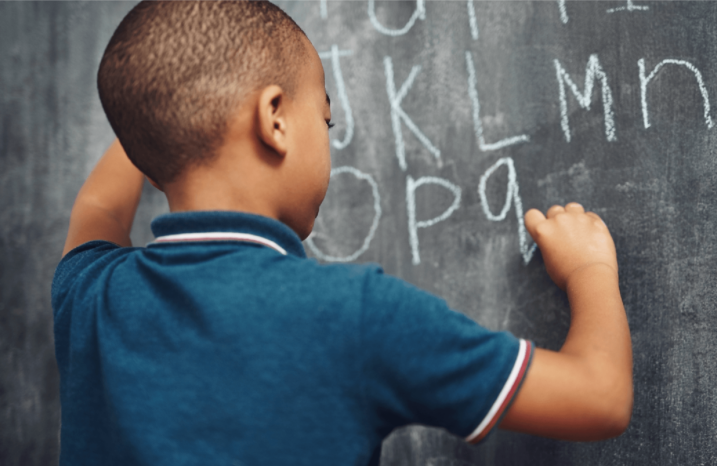What are Learning Skills in Childhood?
Learning skills in childhood are all the abilities needed for success in school, such as reading, writing, math, science, technology, and oral presentations.
Every child goes to school to acquire knowledge, and every child can learn. It is important that all children have access to the support they need to be successful and excited about learning. It is wonderful when children can become lifelong learners in areas of interest and strength. It is okay if children struggle a bit to get through school but ultimately learn the skills they need for higher education or meaningful careers.
Symptoms of Learning Problems in Children
Children who are struggling with learning may visibly show their frustration. They may work very slowly, have poor attention, or earn low grades in school. Fortunately, educators have a wide range of tricks of the trade they can employ once the specific issues are identified. At Cadey, we believe that all good intervention starts with an assessment to pinpoint and prioritize the areas for growth. Listed below are some areas of learning where your child may need support.
- Having trouble in school: your child may continue to struggle, even with hard work and support from adults. Kids who fall behind may feel embarrassed around peers, score poorly on tests, and make slow progress through the expected learning standards and lesson plans at school.
These learning problems may be associated with emotional or behavioral problems.
- Low achievement: your child may demonstrate poor academic performance, low grades, and poor test scores. This low achievement may be due to a lack of effort or low ability in these academic areas.
These low scores may be associated with emotional upset, anxiety, or behavior problems.
- Reading problems: your child may have difficulty with reading fluency, which means reading inaccurately, slowly, or hesitantly. This difficulty may be due to challenges decoding words accurately or processing the information on the page. These issues may cause anxiety and other academic problems
- Reading comprehension: your child may have challenges understanding written materials. They may read the words accurately but be unsure of the meaning. These issues may make it hard for the child to answer questions about the text or retell stories they have read in the past
- Struggling with writing: your child may be showing difficulties writing words, sentences, stories, or essays. They may have trouble spelling words or putting the words into sentences logically. These issues may be associated with handwriting problems, organization issues, story-telling difficulties, or comprehension challenges
- Struggling with math: your child may be demonstrating issues with math calculations, story problems, or basic math facts. They may have trouble doing multi-step problems and may struggle with non-verbal reasoning skills in general
Why Identifying Learning Problems Is So Important
- Academic achievement is an important component of a child’s life. While you go to work each day, your child goes to school.
- Whether in the home or the office, your work becomes part of your sense of self and your ability to contribute to the world.
- Your child has the “job” of listening to the teacher, following classroom rules, and completing schoolwork.
- School participation also involves learning to be a part of a social community of peers, with exposure to sports, art, music, and other extracurricular activities.
- Feedback for your child comes in the form of grades. Just as you would know, if you were not cutting it at work, your child will know whether they are not making the cut at school.
- It can be challenging for a child to maintain interest and motivation in school if they are constantly failing. At these times, some children cope by disengaging.
- Children who struggle with learning tend to experience emotional symptoms or behavior problems.
As a parent, you will want to ensure that your child’s school experience is as positive as possible and that your child’s family and community life is positive as well.
Causes of Learning Problems In Children
A myriad of potential problems may be getting in the way of your child’s academic success. In this article, we will address only a few major reasons, as follows: cognitive ability, study skills, learning disabilities, attention problems, environmental factors, emotional concerns, and low self-esteem.
Impaired cognitive ability
Sometimes, a child does not learn as well because a part of their brain is not as adept as other parts of the brain. For example, children with lower Verbal Comprehension scores on an IQ test tend to struggle with reading and writing.
Children with lower scores on the Non-Verbal or Spatial part of an IQ test tend to struggle in math, science, or engineering subjects. Finally, children with lower scores on Processing Speed or Working Memory tend to struggle in multiple academic areas and may have learning disabilities.
Poor study skills
Children who struggle to study will have problems with many academic subjects and tasks. It is often the case that their Executive Functions [1] are impaired.
They may have trouble with planning how to solve problems or to go about an assignment, initiating tasks, monitoring their progress on assignments, or metacognition (thinking about one’s thinking).
Combining these skills is all in the ‘upstairs brain’ [2], which is the part of the brain responsible for higher-order problem solving, thinking, and planning.
The good news is that executive functions develop throughout childhood and into early adulthood; your child’s brain is still ‘working on it.’ More good news here is that higher-order thinking skills can be taught [3-6].
Learning disabilities
Although there are many learning disabilities, the most common types are listed below.
Dyslexia is a learning disability in reading.
Children with dyslexia may have trouble with reading fluency, reading accuracy, or reading comprehension.
Dysgraphia is a learning disability in writing.
Children with dysgraphia may have trouble with spelling, organization, or getting ideas onto the paper.
Dyscalculia is a learning disability in math.
Children with dyscalculia may have trouble with recognizing numbers, calculations, or conceptual understanding in math.
The way someone with one of these disabilities sees, hears, and remembers information is different. Often, phonological processing, which refers to processing sounds that go together to form language, is impaired. This impairment can be very frustrating for a school-aged child.
Three major signs of learning disabilities
- One potential sign that your child may have a learning disability is inconsistent performance.
Your child’s teacher may comment that ‘he could do this yesterday, and now he already forgot it.’ You may notice that your child had their spelling words down pat while studying but still failed the test.
- Another sign of a learning disability is that your child is bright but does not perform well. For example, a child with an extensive vocabulary who has a hard time with reading or writing would raise a red flag.
- Finally, a child who works very slowly in any subject might have a learning disability. Other reasons for slow pacing are possible, so this sign is not definite, but it is a warning sign for learning disabilities or other problems.
Learning disabilities almost always require remediation and intervention. If you suspect your child has a learning disability, it is wise to consult with the school and request an evaluation.
Attention problems
Children with attention problems may really struggle to do well in school. Sometimes, motivation drops when it is tough to do well in school. If your child really struggles with these challenges, you may want to seek an evaluation for ADHD. The sooner you understand how to help your child, the better.
Social isolation
Social isolation is another variable that could impact motivation. Children may struggle when they feel picked on or left out of activities. Children need to feel comfortable and to feel a part of the learning community. If your child is being mistreated, do reach out to the teacher and administration to address this issue. As a parent, you have every right to be involved and understand what is going on at school. Be that advocate for your child.
Also, If a child is spending their time worrying about what insult they will hear next or if they feel alone, with no one to have lunch with or talk to on the playground, these experiences will likely impact their performance at school. Often, children who are bullied or isolated have poor academic performance.
Environmental factors
Environmental factors are important to consider when your child is doing poorly in school, refusing work, or challenging the teacher. Just as your work may suffer after the death of a loved one or a change in family structure (like marriage, divorce, or a new baby), your child may have a tough time feeling motivated and engaged at school when dealing with such issues.
Teachers must know the demographics of their community, understand the family structure of their students, and be sensitive to what children may be going through.
Emotional concerns
A child suffering from depression or anxiety is likely to have school struggles. Families in poverty, suffering through traumatic circumstances, or in the midst of big changes are not often able to provide their children enough stability.
Sometimes, these situations are far beyond their control. In these situations, having nurturing role models at school, extra support, and second chances to succeed can help a child build positive self-esteem.
Low self-esteem
Learning problems tend to share a cyclical relationship with your child’s self-confidence. School success tends to be a yardstick by which kids measure themselves. When your child is struggling, their self-esteem may take a hit.
Children who do not feel good about themselves tend to perform lower, and then they feel even worse about themselves.
One author of this article completed a dissertation on the relationship of child self-perceptions of performance in school with teacher reports, grades, and test scores.
As you might suspect, that study found that children know when they are performing poorly in school. This poor performance leads to lower academic self-efficacy (they believe they cannot do well in school). This lower self-efficacy leads to reduced performance.
What To Do About Learning Problems in Childhood
Clinically, several reasons are possible for explaining academic challenges. Listed below are some potential issues that could impact your child’s learning and what to do to help.
What to do about learning problems due to emotional symptoms
If you see a sudden drop in your child’s general happiness, motivation, or enjoyment of life, it is important to consider depression or significant emotional distress.
If you suspect depression, find a therapist to work with your child. Make yourself available for love, comfort, and support (even if your child does not indicate that they want it).
What to do about learning problems due to behavior problems
If you see your child refusing tasks, having tantrums, or giving up easily, these behaviors are red flags. In these cases, you would be wise to consider an evaluation by a psychologist.
What to do about learning problems due to recent changes in the home
Consider any significant recent changes. Talk to your child in a calm and accepting way; work to understand how emotions and environmental variables may be having an impact.
What to do about learning problems due to physical problems
Make sure your child has a current physical; be sure there isn’t a medical cause for your child’s challenges. Children with frequent illnesses, allergies, and poor eating or sleeping habits are likely to have concurrent learning challenges. Teachers may notice that your child is lethargic, seems tired, or falls asleep in class.
What to do about learning problems due to intrinsic motivation issues
If your child has few or none of the issues above and is still struggling with learning, it could be that they are not motivated toward schoolwork at this time. Keep in mind that kids will not always be intensely interested in what they are learning in school, and it is okay if their motivation wanes from time to time.
The way to create conditions that motivate our kids is to ensure the child has autonomy, competence, and positive relationships.
- Autonomy: Children need to feel a sense of independence and choice to feel motivated toward a task. Maybe your child does not want to do it your way. Allow your child to choose the times of day to study, the topics to research, and the approach to assignments
- Competence: Children feel more motivated when they feel that they have the ability to do the task well
- Relationships: Children are more motivated when they feel good about their relationship with the people involved in the activity. Your relationship with your child is the foundation that will guide them through these challenges at school. Make time each day to talk and do something fun that your child enjoys, regardless of what happened at school.
What to do about learning problems due to extrinsic motivation issues
Even with all of the above in place, your child may not feel intrinsically motivated toward school sometimes. In that case, they may require extrinsic rewards for a specified time on a particularly challenging task. Remember that even adults need extrinsic rewards to get things done. A paycheck is an extrinsic reward for going to work. A full gas tank is an extrinsic reward for standing out in the cold at the gas station before a long trip. It is okay if your child needs some rewards to be motivated at times.
Set up a simple reward system at home with privileges or treats earned with effort, such as listening to the teacher and completing assignments. This system should not be grade-based but effort-based. Reward your child for putting in great effort rather than focusing solely on objective results.
When to Seek Help for Learning Challenges
The most important times to seek help are when your child seems to have a learning disability or significant learning need and when your child has significant emotional distress. In either case, supports are available to help your child have a better experience in school and life in general.
Check for a learning disability: Ask whether learning problems are evident in your child’s thinking and reasoning abilities, reading, writing, or math skills. If so, your school can evaluate these areas to determine if your child has a learning disability. Resources may be available for intervention through the school’s Response to Intervention program.
Your child may require a 504 Plan or Individualized Education Program (IEP) for accommodations or services. The good news is that many people with learning disabilities learn how to live with these challenges and thrive.
Although most learning disabilities are lifelong, the intensity of the struggle and challenge will significantly lessen with the right kind of support and intervention.
If you don’t get the support you want from your child’s school, consider seeking a private evaluation to see how your child is doing cognitively and academically, with a focus on social-emotional development.
Consider counseling: If your child seems to be anxious or consistently has meltdowns, there may be an emotional issue worth addressing in therapy. A Licensed Psychologist, Licensed Clinical Social Worker (LCSW), or Licensed Professional Counselor (LPC) would be needed for therapy or to make diagnostic decisions regarding emotional disorders.
Similar Conditions To Learning Problems in Childhood
- Executive functions: problems getting started, planning out assignments, and keeping track of progress
- Family problems: problems within the family system, such as divorce, illness, or poverty that impact a child’s ability to engage in learning
- Behavior problems: problems with compliance, not listening, or following directions will impact learning
- Emotions & mood: problems with emotional regulation can have a significant impact on academic performance
- Attention: problems shifting or sustaining attention have an impact on learning
Professional Resources on Learning Skills in Childhood
- Psychologist or neuropsychologist: to consider symptoms in a mental health context. Have a comprehensive evaluation to determine your child’s profile and consider learning, attention, ability, and emotional symptoms
- School psychologist: to consider symptoms in a learning context or evaluate for school services.
- Occupational therapist: to look at fine motor needs if there are any issues with handwriting or visual tracking that are impacting your child’s learning
- Speech-language pathologist: to look at issues with receptive or expressive language that may impact your child’s learning
Book Resources for Learning Problems in Childhood
Anderman, Eric M. & Anderman, Lynley Hicks (2009). Classroom motivation.
Deci, Edward L. (1995) Why we do what we do: Understanding self-motivation.
Dawson, Peg & Guare, Richard (2009). Smart but scattered: The revolutionary “executive skills” approach to helping kids reach their potential.
Dawson, Peg & Guare, Richard (2010). Executive skills in children and adolescents: A practical guide to assessment and intervention, second edition.
Eide, Brock & Eide, Fernette (2006). The mislabeled child: How understanding your child’s unique learning style can open the door to success.
Kroncke, Willard, & Huckabee (2016). Assessment of autism spectrum disorder: Critical issues in clinical forensic and school settings. Springer, San Francisco.
Reid, Robert, & Leinemann, Torri Ortiz & Hagaman, Jessica L. (2006). Strategy instruction for students with learning disabilities, second edition.
Perseverance book for kids
Esham, Barbara (2014) Keep Your Eye on the Prize (Adventures of Everyday Geniuses).
Gordon, Jon (2012). The energy bus for kids: A story about staying positive and overcoming challenges.
Kobi, Yamada & Besom, Mae (2013). What do you do with an idea?
Zentic, Tamara (2015). Grit & bear it activity guide: Activities to engage, encourage, and inspire perseverance.
Deak, JoAnn & Ackerley, Sarah (2010). Your fantastic elastic brain stretch it, shape it.
Hamm, Mia (2006). Winners never quit!
McCumbee, S. (2014) The garden in my mind: Growing through positive choices.
McCumbee, S. (2014). The garden in my mind activity book.
Learning & motivation books for kids
Cook, Julia (2013). Thanks for the feedback, I think (Best me I can be!)


